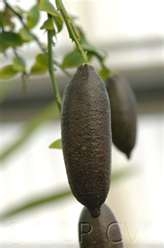Since 1910, the Citrus Variety Collection has been a resource for research, citrus breeding and educational extension activities initially for the UC Citrus Experiment Station and now for the expanded College of Natural and Agricultural Sciences at UC Riverside. As one of the most diverse collections of citrus varieties and related types in the world, this collection currently has three locations, the central collection is at UC Riverside and two smaller collections of citrus relatives are at South Coast Research and Extension Center in Irvine, CA and the Coachella Valley Agricultural Station in Thermal, CA. The collection consists of approximately 1,800 trees representing two trees of each of the 900 different types of citrus and citrus relatives. Approximately 640 of the types are within the sub-genus Citrus. Most commercial citrus varieties such as the different mandarin varieties are classified botanically in the sub-genus Citrus of the genus Citrus. The collection has approximately 170 different mandarin and mandarin hybrid types including 14 Clementine selections, W. Murcott Afourer, and the UCR developed mandarin hybrids Gold Nugget and the Shasta Gold™, Tahoe Gold™ and Yosemite Gold™ mandarin hybrids. Commercial types that are exceptions to this include the kumquats, which are in the genus Fortunella and the Trifoliate oranges commonly used as a rootstocks or as parents for hybrids which are in the genus and species Poncirus trifoliata. The genera Fortunella and Poncirus as well as the 30 other genera related to the genus Citrus are classified within the subfamily Aurantiodeae of the Rutaceae plant family. The UC Riverside Citrus Variety Collection has 900 types within 28 of the 33 genera of the subfamily Aurantiodeae of the Rutaceae.
The Citrus Variety Collection has varieties that were incorporated into the collection in the early 1900s and newer varieties that were recently imported into California from other parts of the world through the efforts of the UC Citrus Clonal Protection Program . The diversity in the collection is apparent visually by types with fruits of unusual shapes, sizes, colors, and tastes growing on trees of varying heights, forms, and foliage characteristics. There are types with fruit as big as one’s head and ones as small as a green pea. This living collection also produces fruit with variation in the chemical compounds of the rind and flesh noticeable by the great differences in tastes, textures, and aromas. One type that has recently received attention is the Australian Fingerlime or Microcitrus australasica which has fruit flesh composed of small round juice vesicles that look like caviar and have a flavor and aroma reminiscent of lime. Underlying all of this visible and tangible diversity is genetic diversity which can and has been manipulated, combined, and transferred for the improvement of citrus crops for productivity, taste, and disease and environmental tolerance or resistance and the development of new food and horticultural crops.
The range of diversity within this collection makes it a valuable resource for research for the California Citrus Industry. Currently, the collection serves as a genetic resource for an array of research projects conducted by researchers from UC Riverside and other Universities which range from scion and rootstock breeding for the improvement of commercial varieties to the study of the biological activities of citrus limonoids as anticancer agents. Since 1997 over 40 different projects have utilized trees in the Citrus Variety Collection. The USDA-ARS National Clonal Germplasm Repository for Citrus and Dates (NCGRCD) in Riverside situated adjacent to the collection, uses the Citrus Variety Collection as its field site to help fulfill its mission to acquire, preserve, distribute, and evaluate genetic diversity within Citrus, and the 32 related Aurantioideae genera.
The Citrus Variety Collection also serves as a resource for many extension activities. California citrus growers, nursery owners, and other industry representatives, as well as students and teachers from local public schools, the University of California, and the California State College campuses visit the collection to evaluate potential commercial citrus varieties and learn about citrus diversity. In addition to tours, the staff of the Citrus Variety Collection provides fruit displays and oral presentations on the performance of various citrus cultivars at CRB and UC Cooperative Extension sponsored growers meetings, at the Sunkist Annual Meeting, the World Ag Expo, and the Orange Blossom Festival in Riverside CA. The various fruit displays and the citrus tasting at the Riverside Orange Blossom Festival which is visited by thousands each year, is picked from the collection.
In March 2003, the Advisory Committee for the Citrus Variety Collection established an endowment fund. The goal for the endowment fund is to be the primary source of financial support for the maintenance and activities of the Citrus Variety Collection. The goal is that the portion of the endowment fund will in the future provide major support for the maintenance and activities of the Citrus Variety Collection as state funds become more limited. If you would like to know more about the Citrus Variety Collection or learn how you can help support the collection, contact Dr. Tracy L. Kahn or (951-827-7360 or visit the Citrus Variety Collection web site.

Author - Technical Specialist